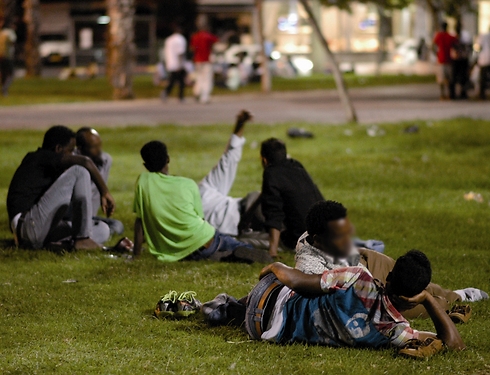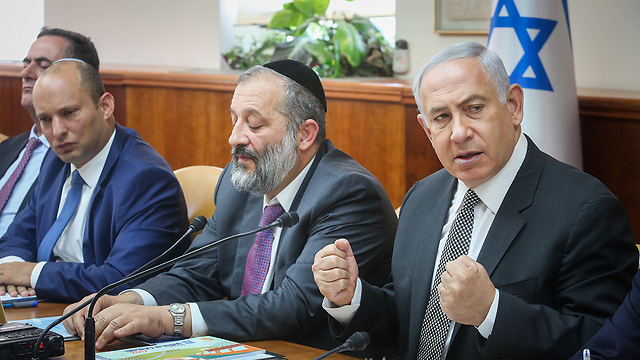

Shaked, Deri move to deport migrants without consent
Week after High Court slaps 60-day limit on detention of illegal migrants, justice minister and interior minister convene meeting to promote legal measures, including altering existing law and agreements with other African countries, to facilitate deportations without consent; ‘minor adjustments are required to the agreements ... for the deportations to be carried out,' says Shaked.
Justice Minister Ayelet Shaked (Bayit Yehudi) and Interior Minister Aryeh Deri (Shas) held discussions Sunday on the possibility of deporting illegal migrants against their will, despite a recent decision by the High Court of Justice (HCJ) restricting their detention in holding facilities to 60 days.
Two main points were discussed during the meeting. The first involved altering agreements signed with other African countries, which would enable the possibility of forcing the migrant workers leave without their consent.
The second possibility which was mooted was the alteration of current legislation which would enable the state to bypass the ruling.
Politicians and residents of the areas most affected by the waves of illegal migrants in recent years have complained that soliciting their consent will become an increasingly arduous task given that the migrants now know that they only have to hold out for 60 days before being discharged from detention facilities.
According to the existing law, foreign migrants may be indefinitely held in detention centres until they are “convinced” into agreeing to being deported. The new HCJ verdict therefore seriously curtails the state’s power to lean on migrants who resist forced deportation by depriving it of the tool of prolonged detention.
The discussions considered creating a series of incentives for the migrants to leave Israel, whether voluntarily or without their full consent.
“The ruling enables the state to remove the infiltrators even without their consent,” Shaked insisted during the talks, “but it completely stifles matters in cases where there is an agreement on their part. In order to solve this problem, minor adjustments are required to the agreements with other countries in order for the deportations to be carried out and withstand the test of law."
Deri emphasized the need to begin by cutting off the phenomenon of work prospects for the migrants, stating that business-owners would no longer be able to employ those who refused to leave Israel without serious ramifications.
“It is inconceivable that an infiltrator refuses to leave and is then released into a free and normal life and is employed by Israelis,” said Deri.
The meeting was attended by Director General of the Population and Migration Authority (PMA) Prof. Shlomo Mor-Yosef, Deputy Attorney Generals Roi Sheindorf, Dina Zilber and Raz Nazri. Also joining the discussions were representatives of the PMA and officials from the Ministries of Justice, Finance and Foreign Affairs.
Speaking earlier during the opening of the weekly cabinet meeting, Prime Minister Benjamin Netanyahu reiterated the position he laid out on the matter last week before a crowd of South Tel Aviv residents.
“We are not talking about refugees. Only a few of them are refugees but the majority are economic migrants. We need to protect our borders,” he told his cabinet.
“Today we will establish a special team of ministers who will meet with the residents every few weeks. The main aim is to return these neighborhoods to the residents and to deport from the State of Israel the illegal infiltrators whose place is not here.”


















